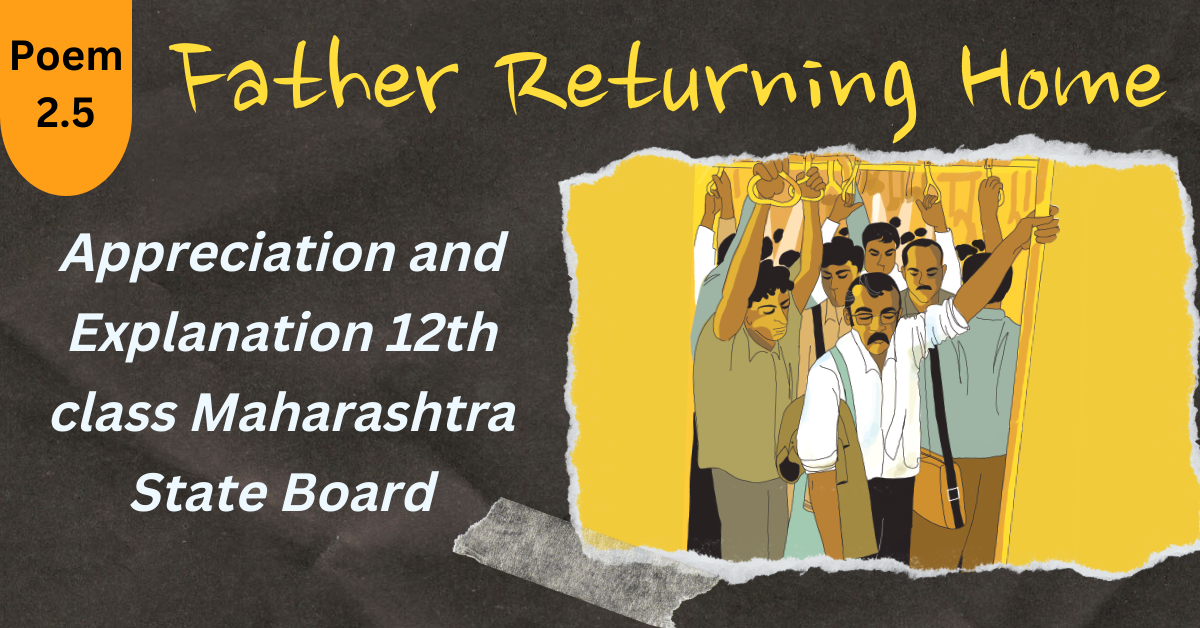Father Returning Home Appreciation and Explanation 12th class HSC
Father Returning Home is the poem in your Maharashtra State Board for the HSC exam. The poem Father Returning Home will be asked to write an appreciation of the poem and some stanzas will come to solve the activities. This appreciation and explanation help you to solve the activities in the poem Father Returning Home. Here you will get an appreciation and explanation of the poem Father Returning Home.
Introduction: Father Returning Home Appreciation and Explanation
Dilip Chitre (1938 to 2009) was a celebrated bilingual poet and translator with a remarkable work in Marathi and English. His versatile creativity extends to painting, film-making and his notable contribution as a magazine columnist. He received the prestigious Sahitya Akademi Award, both for poetry as well as for his well-known translation work ‘Says Tuka’, popular abhangas (spiritual poems) by Sant Tukaram. He had started translation of literary work of saints in Marathi at the age of 16. Exile, alienation self -disintegration and death are observed to be the major themes of his works.
This poem Father Returning Home is taken from ‘Travelling in a Cage’. It draws a portrait of a suburban commuter. It depicts his dull, monotonous, exhausting and equally pitiable daily routine. It describes a forced alienation at home, which is reflected through the stale food and lack of sharing. His children refuse to share their joys and sorrows with the hardworking father who as a result is forced to retire into solitude. This very painful loneliness is a symbol of man’s isolation from the materialistic man-made world.
Poem: Father Returning Home Appreciation and Explanation
My father travels on the late evening train
Standing among silent commuters in the yellow light
Suburbs slide past his unseeing eyes
His shirt and pants are soggy and his black raincoat
Stained with mud and his bag stuffed with books
Is falling apart. His eyes dimmed by age
Fade homeward through the humid monsoon night.
Now I can see him getting off the train
Like a word dropped from a long sentence.
He hurries across the length of the grey platform,
Crosses the railway line, enters the lane,
His chappals are sticky with mud, but he hurries onward.
Home again, I see him drinking weak tea,
Eating a stale chapati, reading a book.
He goes into the toilet to contemplate
Man’s estrangement from a man-made world.
Coming out he trembles at the sink,
The cold water running over his brown hands,
A few droplets cling to the greying hair on his wrists.
His sullen children have often refused to share
Jokes and secrets with him.
He will now go to sleep
Listening to the static on the radio, dreaming
Of his ancestors and grandchildren, thinking
Of nomads entering a subcontinent through a narrow pass.
-Dilip Chitre
Explanation:
The poem is about the account of the poet’s father. The poet tells how his father travels every day of his father at home and depicts the scene of home. The poem is divided into two stanzas. The first stanza consists of 12 lines and the second stanza consists of 13 lines. In the first stanza, the poet mentions the condition of his father and how the father travels home from his job every day and in the second stanza, the poet mentions the condition of his at home.
The first stanza: Father Returning Home
The father of the poet travels every day from his job on a late evening train to reach home. This is the daily routine of his father. In the travel, his father is standing among silent commuters in the yellow light of the train. The yellow light of the train shows the dull and boring life of people who travel every day by train from their jobs to home. While standing on the train, as the train moves the suburbs area pass in front of the father’s eyes but the poet mentions that the suburbs slide past his unseeing eyes because the father is not interested to see the suburbs’ sights due to tiredness.
Further, the poet shows how is the appearance of the father while returning home. Father’s shirt and pants are wet (soggy)and his black raincoat is marked with mud due to the rainy atmosphere. His bag is stuffed with things and books and they all look like any time falling apart from the bag. Here the poet wants to tell that books are used to read on a train for making time pass. Due to old age father’s eyes dimmed and that’s why the father moves slowly homeward through the cold and moist (humid) rainy (monsoon) night.
Now the poet can see that his father is getting off the train as a word dropped from a long sentence. By this line, the poet wants to tell that by reading sometimes we just dropped or omit a word but we get the sense of that sentence because of less importance of that word, same here the word consider metaphorically to father that he is less important in this world that no one considers the importance of the father in this world.
From getting off the train father is hurry to cross the distance between the grey platform and the railway line. Then he enters e lane and walks but his slippers (Chappals) are sticky with mud in the rain still he hurries onward to home because he has no friends or others whom he will meet.
The second stanza: Father Returning Home
In the second stanza, the poet depicts the isolated life of the father because his family does not consider him as important as a family member.
Father comes home again, where he will go because the only place that remains in this world is home. The poet sees his father drinking cold or less hot (weak) tea at home, no one makes hot and fresh tea for him because he is coming from the rain how cold he may feel at that time but no one has care for his father at home. Further father eats stale chapati, this also shows how the father is less important in the family and works hard for the family who comes late home from the job but in the family, the family members do not care for him as he became old. He reads a book which means no one speaks to him.
Then he goes into the toilet to think deeply (contemplate) about his life and the condition of life for alienation from the man-made world from the materialistic world that has no place for emotions.
Then he comes out of the toilet and he trembles due to old age at the sink. The cold water flows over his brown old hands. The poet mentions cold water because the family does not give him hot water to wash his hands. The brown hands show how he has been working for the family. The poet mentions that a few drops of water cling to the graying hair on his wrists, this shows the old age of his father.
At home, his bad-tempered (sullen) children have always no interest to share happy moments of them or any plans for them to do in their life. it means his children do not speak with him any things and they made him isolated from them too. So now he will go to sleep because there is no sharing in the family and he listens to the static on the radio but he wonders by dreaming of his ancestors (past) and grandchildren (future) thoughts or thinking so how the ancestors are nomads who travel from place to other and entering a subcontinent through narrow pass but they were careful to their relation to each other. The father thinks of grandchildren and how they will live their life and future.

Appreciation: Father Returning Home Appreciation and Explanation
About the poem/ poet/ title:
The poem is written by the great Poet Dilip Chitre. He is a well-known Indian bilingual poet. His versatile creativity extends to painting, film-making, and his notable contribution as a magazine columnist. He received the prestigious Sahitya Akademi Award. This poem is taken from ‘Travelling in a Cage’. It draws a portrait of a suburban commuter that is his father.
The title itself is apt to the theme of the poem. The poet describes the daily routine of his father which is how the father is returning home from his job. Poet also shows the alienation of the father from the man-made world.
Theme:
The theme of the poem father Returning Home is alienation of a suburbs commuter from a man-made world. The poem is autobiographical. The poet depicts the picture of the father and how he comes from his job late at night. The father felt loneliness in the man-made world as well as in the family. Children refuse to share joy and secrets with their father. Family members neglect the old father who works for them even in old age. The poet mentions how the old father thinks about ancestors lived and grandchildren will live materialistic life. The poem has two stanzas consisting of 12 lines each.
Poetic devices:
The poem is a free verse which is no meter and no rhyme scheme. The language of the poem is simple but highly symbolic. The poem is in first-person narration.
In this poem, the poet used simile, Alliteration, and Onomatopoeia figure of speech to increase the beauty of the poem.
Value/ Message:
The message of the poem is we should love the old person in our family. The old father is the most important person in the family who sacrifices his whole life for the family. The father is the backbone of the family we should consider him the most important person in the family. In old age, our parents need our help to leave them in isolation. The old parents are like maps who guide us by their experiences as a map to travel the life of journey.
Your opinion about the poem:
I truly feel the pain of the poet’s father and how he was living in that time when his children refuse to share joy and secrets with him. I will take care of my parents as well. Everyone considers the importance of parents in the family because they do everything for the children’s sake. Thus I like the poem Father Returning Home very much.
You may also learn about the Poem: Have You Earned Your Tomorrow 12 Class







